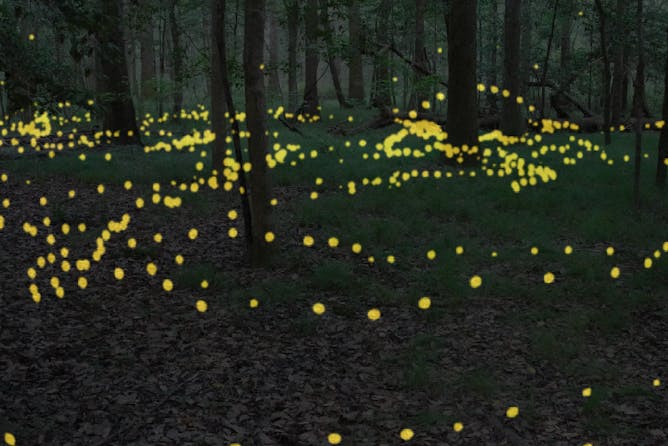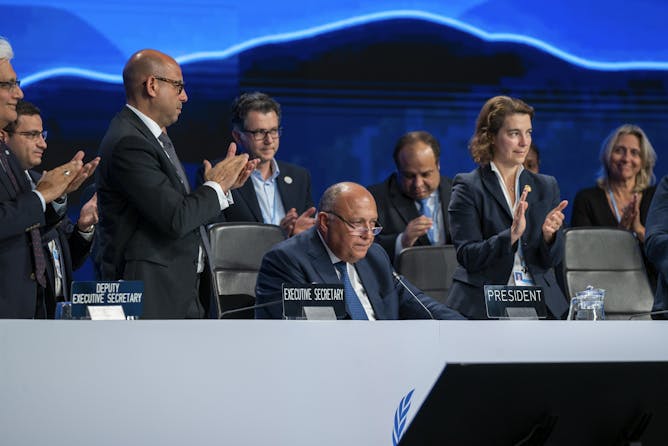|
Welcome to Sunday and the best of The Conversation.
I’ve always been a big fan of fireflies. They were abundant in my home state of Ohio. As kids, we loved catching them and putting them in a jar – behavior that seems a little shocking to me now.
University of Colorado Boulder postdoc Raphael Sarfati is a physicist with the enviable job of studying animal collective behavior. In one of our readers’ picks this week, we learn about his field research that shows fireflies do flash in synchrony – except for the ones that don’t.
The U.N. climate conference wrapped up last weekend with the announcement of a new “loss and damage” fund to help poor nations recover from climate disasters. This week’s editors’ picks include a story by Adil Najam, a professor of international relations at Boston University, who explains how the promise of this deal might differ from the reality. Najam’s is just one of more than 80 stories about COP27 written by academics and edited by our global team of journalists. Read a few to get a broader perspective on the climate change conference.
This week, we’ll bring you stories about a new way to measure forest carbon offsets, the hype around graphene and a course on failure.
Speaking of failure, have you taken this week’s news quiz yet? Just kidding – it’s not that hard!
|

Fireflies’ synchronized light shows have fascinated observers for ages.
Raphael Sarfati
Raphael Sarfati, University of Colorado Boulder
Synchrony is ubiquitous throughout the universe. But physicists’ equations predicted there could also be erratic exceptions marching to their own beat. Now they’ve been spotted in firefly swarms.
|
|
|
-
Anjana Susarla, Michigan State University
If Twitter were to go dark, with it would go a valuable source of data as well as a means of sharing information relied on by activists, journalists, public health officials and scientists.
-
John Eric Goff, University of Lynchburg
Adidas releases a new ball for every World Cup. At the highest level of play, a ball that behaves in unexpected ways can throw players off. A sports physicist explains the science of this year’s ball.
-
Richard Border, University of California, Los Angeles; Noah Zaitlen, University of California, Los Angeles
People don’t randomly select who they have children with. And that means an underlying assumption in research that tries to link particular genes to certain diseases or traits is wrong.
-
Peter Lehman, Arizona State University
The son of the director has argued that Americans are still too squeamish about sex to fully appreciate the film. A porn scholar disagrees.
|
|

Egyptian Foreign Minister Sameh Shoukry closes COP27 in the early hours of Nov. 19, 2022.
Christophe Gateau/picture alliance via Getty Images
Adil Najam, Boston University
It’s a landmark agreement, acknowledging for the first time that wealthy countries bear some responsibility to help. But it leaves many unanswered questions.
|
|
|
-
Robert B. Talisse, Vanderbilt University
Lots has been said about the 2022 US midterm elections. But a scholar of democracy says there’s really only one conclusion that can be made about how voters behaved.
-
Diane Cress, Wayne State University
The symptoms of B12 deficiency resemble a lot of other health problems, putting millions of Americans at risk of a misdiagnosis.
-
Alex McCourt, Johns Hopkins University
Colorado is one of 19 states that have laws in place to prevent individuals believed to pose a threat from obtaining guns. But a preventive order needs to be petitioned before it can be issued.
-
Lynda Kachurek, University of Richmond
Books are one of the oldest forms of communication ‘technology,’ a scholar writes, and understanding how they’ve evolved over time provides insights into their role in society.
|
|
|
|